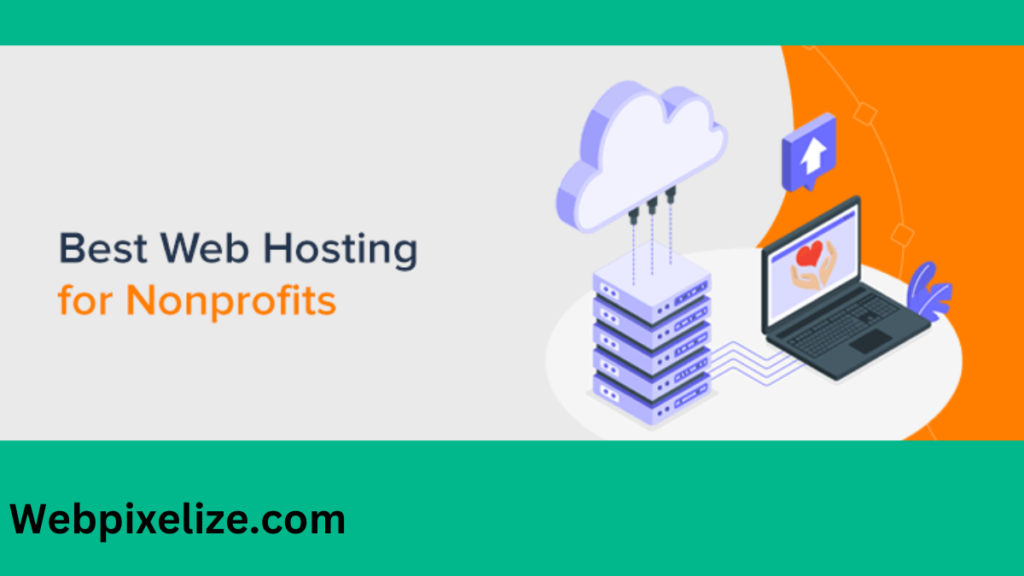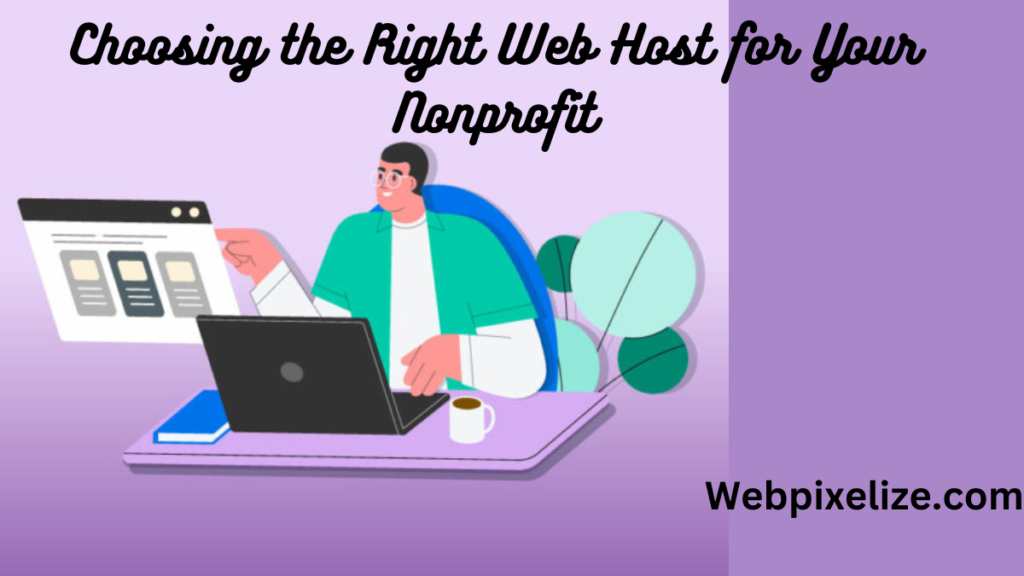Web Hosting For Nonprofits
Attention all nonprofits! Are you ready to make a difference online and expand your impact? Look no further because we’ve got the ultimate solution for you – web hosting specifically designed for nonprofits.
In this blog post, we’ll dive into the world of web hosting and explore how it can revolutionize your organization’s digital presence. Whether you’re a small local charity or an international nonprofit powerhouse, buckle up as we uncover the secrets to creating an engaging website that drives donations, engages volunteers, and amplifies your mission.
Get ready to harness the power of technology in support of your cause – let’s embark on this exciting journey together!
Table of Contents
What is a Nonprofit?
Nonprofit organizations need to find a web hosting provider that is affordable, reliable and has features that will help their organization run smoothly.
A nonprofit web hosting company should have a wide variety of hosting plans to choose from. They should also be able to provide helpful resources and support for nonprofits.
Some key features that are ideal for nonprofit organizations include unlimited storage space, unlimited bandwidth, secure connections, and easy site management. Some of the best nonprofit web hosting providers include SiteGround, WP Engine, and GoDaddy.
Types of nonprofits
There are many types of nonprofit organizations out there. Some are focused on a certain issue, like AIDS research or environmental protection. Others focus on helping people who are in need, like Oxfam or the Red Cross.
Some nonprofits work with governments to improve policy or solve problems. International aid organizations, such as Doctors Without Borders or Save the Children, are examples.
And finally, some charities collect money from donors and spend it on good causes, like the Salvation Army or St. Jude’s Children’s Research Hospital. Each type of nonprofit has its advantages and disadvantages. A few tips to help you choose the right nonprofit for your cause:
- Do your research: Find out what kind of organization is best suited for your specific project or goal. There are many resources available online, including nonprofit directories and search engines.
- Consider your budget: Not all nonprofits require donations from members or donors; some operate solely through government grants or contracts. Look at how much money you want to spend and see if a given nonprofit is a good fit for your budget constraints.
- Determine your target audience: Are you hoping to reach out to people who live in a particular area? Or do you want to focus on one particular demographic group? Nonprofits typically have different methods for reaching their target audience, so be sure to explore them all before committing.
- Decide where you want your nonprofit to operate: Some nonprofits focus on solving a problem in a specific location, while others are more global in scope. Determine where your interests lie and see if the nonprofit fits that mandate.
- Choose the right IRS Classification: There are many different types of nonprofit organizations, each with its specific tax classification. Find out which one best suits your organization’s goals and objectives.
- Consider forming a nonprofit alliance: Many nonprofits work together to achieve common goals, and allying can help you save money on administrative costs and strengthen your public image.

Why Choose a Nonprofit Web Host?
Nonprofit organizations have specific needs when it comes to web hosting. Mainly, nonprofits need a host that can handle high traffic volumes and provide reliable service. Additionally, they should choose a host that offers affordable rates and robust features. Nonprofit web hosts should be easy to work with and offer helpful support.
When choosing a nonprofit web host, be sure to look for hosts with the following features:
- High Traffic Volume: Nonprofits need web hosts that can handle high traffic volumes. Hosts that can provide reliable service and handle high-traffic loads often offer discounted rates.
- Affordable Rates: Nonprofit organizations should choose hosts that offer affordable rates. Hosts with affordable rates often have robust features and offer helpful support.
- Robust Features: Nonprofits need web hosts that offer robust features. These hosts should be easy to work with and offer helpful support.
- Easy to Use: Nonprofits should choose hosts that are easy to use. These hosts should have user-friendly interfaces and helpful support.
The Different Types of Hosting For Nonprofits
There are many different types of nonprofit web hosting available on the market. Some are tailored more toward specific types of nonprofits, while others can be used by any type of nonprofit. Each has its own set of benefits and drawbacks.
The following is a brief overview of some of the most common types of nonprofit web hosting:
- Reseller Hosting: Reseller hosting is a type of hosting that is typically leased and sold through a reseller. This model is suited for smaller nonprofits that do not have the resources or expertise to manage their web infrastructure. Reseller hosting providers typically offer monthly plans with unlimited websites and bandwidth, but they may also require additional fees for features like domain registration and email services.
- Cloud Hosting: Cloud hosting is a type of hosting that allows nonprofits to run their website on remote servers owned by a third-party provider. This model is popular among larger nonprofits because it allows them to manage their website without having to install and maintain hardware or software. Cloud hosts usually offer monthly plans with unlimited websites and bandwidth, but they may also require an initial investment in equipment or software.
- Server Hosting: Server hosting is a type of hosting that is typically purchased outright and installed on the nonprofit’s servers. Server hosting is popular among larger nonprofits because it offers more control over website design and maintenance. Providers typically offer monthly plans with unlimited websites and bandwidth, but they may also require an initial investment in equipment or software.
- Proprietary Web Hosting: Proprietary web hosting is a type of hosting that is usually reserved for larger nonprofits. This model offers greater control over website design and maintenance than other types of hosting, but it can be more expensive and difficult to use. Providers typically offer monthly plans with unlimited websites and bandwidth, but they may also require an initial investment in equipment or software.
Several hybrid hosting options allow nonprofits to combine features from different types of hosting. For example, a nonprofit may purchase server hosting to give them more control over website design and maintenance, but they may use cloud hosting to run their website on remote servers.

Choosing the Right Web Host for Your Nonprofit
Nonprofits face several unique challenges when it comes to web hosting. Unlike businesses, which are often focused on generating revenue and growing their online presence as quickly and efficiently as possible, nonprofits typically have a higher purpose: helping others.
So, what factors should you take into account when choosing a web host for your nonprofit? The following are six key considerations:
- Size and scope of your nonprofit: Your nonprofit’s size and scope will affect which web host is best suited for it. If you have a small organization with just a few websites, a shared hosting plan might be sufficient. If, on the other hand, your nonprofit has dozens or even hundreds of websites, you’ll need to consider a dedicated hosting plan or an enterprise hosting plan with more resources.
- Infrastructure requirements: Your nonprofit will also need to take into account its infrastructure requirements when choosing a web host. For example, some hosts require that your organization have its domain name (e.g., orgname.org) and server(s). Other hosts offer shared hosting plans that allow your organization to use the host’s domain name and server space without having to purchase separate domains or servers outright.
- Domain name and hosting requirements: Many web hosts offer domain name and hosting services in addition to web hosting. If your nonprofit owns its name (e.g., orgname.org), then you don’t need to take any additional steps. However, if your nonprofit does not own its name (e.g., your organization is a branch of a corporate non-profit), then you’ll need to find a host that offers domain name and hosting services as part of its web hosting package.
- Domain registration and DNS management: Some hosts require that your nonprofit sign up for their domain name registrar or manage its own DNS servers. If your nonprofit doesn’t have the expertise or resources to do so, then a host might be a good option for you.
- Security and data protection: When it comes to security and data protection, many hosts offer features such as intrusion detection/prevention systems (IDS/IPS), firewall protection, and data backup and recovery mechanisms.
- Ease of use for website administrators: Your nonprofit’s website administrators will need easy access to the web host’s administrative interface to manage website content, settings, and users.
Once you’ve determined which factors are most important to you, consult with a web host advisor to see which hosting plan is best suited for your organization.
Some Other Ways to Arrive at a Decision About Which Web Host to Use for Your Nonnonprofit
When it comes to choosing a web host for your nonprofit, there are many other factors to consider besides price. Some of the other important considerations include:
- Server location: Your nonprofit should choose a web host that has servers located in a country with low internet latency.
- Admin panel options and features: Your nonprofit needs robust admin panel options and features to keep track of all its data.
- File size limits: Make sure your nonprofit’s files don’t exceed the file size limits of the web host you choose.
- Software compatibility: Make sure your nonprofit’s software is compatible with the web host you select.
- Support: Make sure the web host you choose has a good support team to help you with any issues.
- Data security: Make sure the web host you choose has measures in place to protect your nonprofit’s data from theft or misuse.
- Price: Make sure the web host you choose is affordable.
- Customizable domains: Make sure the web host you choose can provide your nonprofit with custom domains.
- Ease of use: Make sure the web host you choose is easy to use.
- Web server availability: Make sure the web server your nonprofit uses is available and robust.
- Web server performance: Make sure the web server your nonprofit uses can handle the loads your nonprofit will put on it.
- Web server uptime: Make sure the web server your nonprofit uses is always up and running.
Conclusion
Nonprofits face unique challenges when it comes to web hosting. As a nonprofit, you are often working in an open and transparent environment where the public can access your information and learn about your work.
This makes web hosting for nonprofits critical, as it must be reliable and secure enough to protect your data but also easy to use so that volunteers can easily find what they’re looking for. We recommend using Bluehost as a nonprofit web host because of its excellent customer service, flexibility, and affordable rates.